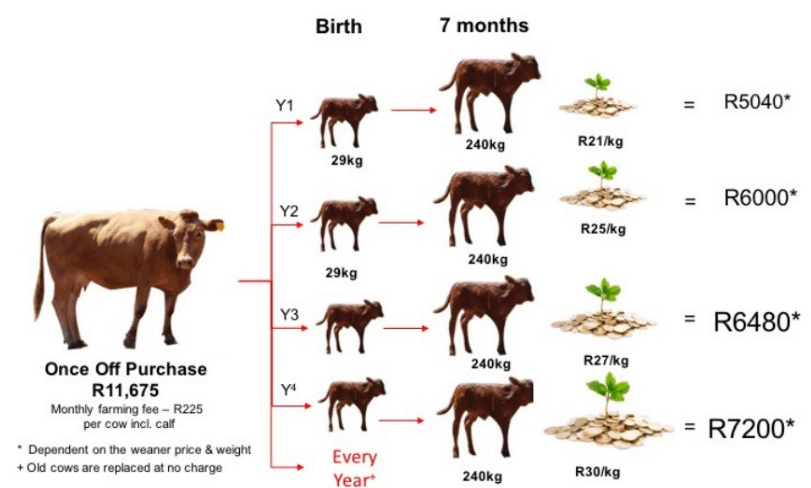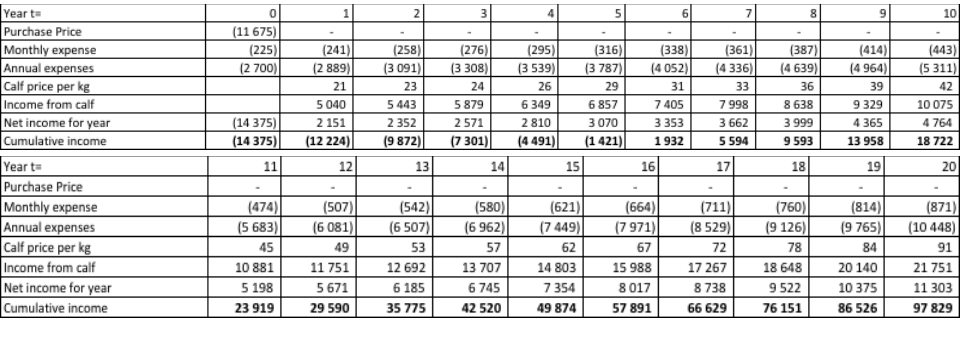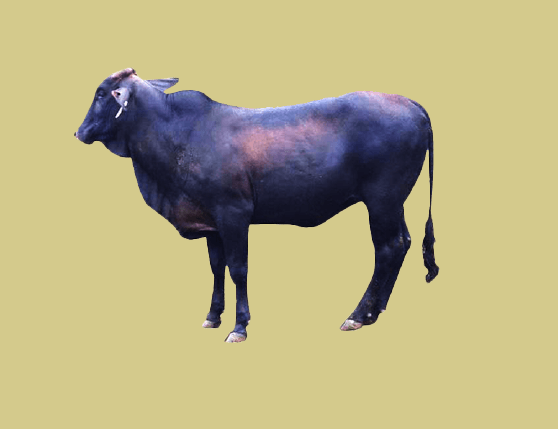LiveStock wealth offers the opportunity to invest in cows, in South Africa. This firm has been two years in operation and has customers from across the world. Cattle Investors can purchase cows from Livestock wealth and then make a profit when selling the calves. The cows are managed on Livestock wealth farms. This platform offers interested investors an easy and straightforward way to get into the cow business without getting their hands dirty! – Consider this investment as cattle farming for dummies.
How profits are made:
Investors purchase a cow, then pay monthly maintenance fees which include; all veterinary expenses, basic insurance which covers natural death by illness, preventive tagging , animal branding and fencing. As of December 2016, a cow costs R 11’675.00 (803 Euro, $835) and the annual mainteance costs amount to 2700 (185 Euros, $200).
Potential Cattle farming profits – through LiveStock wealth.

Schedule of expected income and profits (December 2016)

We had the pleasure of asking Mr Shezi, CEO Livestock-wealth more questions about his offerings:
Interview with LiveStock Wealth:
What is the story behind your firm?
There are many stories and influences that gave birth to Livestock Wealth. The most important of all is enabling people to save in an asset type they understand so that they can be able to provide for their families education, weddings, and funerals.
What is your business model – How does your firm make money?
We make a fair margin when we sell the cow to the investor. We also have a small margin on the monthly fee the owner of the cow pays for the upkeep of the cow. In future, we will offer credit products against the cows under management.
How many cows have you brought personally through your firm?
I do not own cows personally yet I have a lay-by (lay-away plan) that I contribute monthly towards a cow. The focus has been on ensuring that people have cows.

How many cows have you sold in 2016?
We have 450 cows under management now – that means 424 were sold in 2016.
Investment Structure:
Do you have cows available for sale at the moment?
Yes
Do the cows produce milk commercially, and does this earn an income to the investors?
The cows are for beef. They produce enough milk for their offspring only.
Can an investor choose not to sell the cows in order to grow his herd?
We get that question a lot. Due to space limits on a farm, the most efficient way of growing the herd is selling the offspring and using the proceeds to buy another cow – which could be in another farm.
Do the cows get pregnant every year, are there any years where they do not get pregnant?
Sometimes they do not – we expect that out of every 100 cows only 85 will give us offspring. A cow that does not become pregnant after two attempts is sold off and replaced with a productive cow.
Is there a website which gives the current market prices for calves?
One of the large banks publishes a report twice a month. We will be posting this on our website too.
Do you intend to have a secondary market for selling cows, where investors can trade cows with each other?
In time yes – for now, we are seeing more people wanting to grow their personal herd.
Risks:
Since you have started your operations how many cows have been stolen?
None.
Have you lost any cows or calves through lighting or wild life attacks or dogs, how many?
One calf was attacked by the neighbour’s dogs, her mother is fine and has given us another calf already. The loss of the calf was shared by owners of the calves in that specific farm as the dividend is mutualised.
The farms in your region are not experiencing drought at this time, What measures are you taking if the situation changes?
In such an event we will buy grass as a group. It is easier sharing the costs of the grass than when farming alone. On the flip-side – the price of beef goes up with the drought offsetting the cost of additional grass.
If a cow injures one of the farm workers, would the owner be liable for any damages? Do you envisage be any situations where an investor be liable for damages by a cow to other people’s property?
The South African culture is not as litigious as in America. In the event of such an event happening it will be treated as a normal workplace accident and no one will sue anyone.
Would buying more cows increase the possibility of a profit? Could an investor ask for his cows to be placed in different farms so as to reduce geographic risk?
Spreading risk by having cows at different farms is ideal – it is the same as owning shares in different companies on the NYSE / NASDAQ. Also, since the farms have limited carrying capacity, it comes naturally that once we have sold all the cows in a specific farm we then open another farm.
You can find LiveStock Wealth:
Web: Livestockwealth.com
Facebook: Livestock Wealth
Twitter: @livestockwealth






